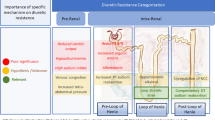Abstract
Background
Renal denervation (RDN) has been proposed as a novel antihypertensive intervention for treating resistant hypertension. It remains to be investigated which patient groups can potentially benefit from RDN. The present study aimed to evaluate the efficacy and safety of RDN in patients with mild–moderate resistant hypertension, i. e., systolic office blood pressure (BP) of 140–160 mm Hg despite treatment with three antihypertensive drugs including one diuretic, or mean systolic BP by ambulatory BP monitoring (ABPM) of 135–150 mm Hg.
Methods
We evaluated data from four relevant clinical studies, all conducted in Europe, comprising 185 eligible patients. The patients’ age was 62.1 ± 10.3 years and 73% were male (RDN group n = 149, control group n = 36).
Results
A self-control comparison showed that RDN led to significantly reduced ABPM at the 6‑month follow-up (systolic ABPM: 147.3 ± 13.4 mm Hg vs. 136.9 ± 15.5 mm Hg; diastolic ABPM: 81.1 ± 9.6 mm Hg vs. 76.2 ± 9.7 mm Hg; p < 0.001). RDN was associated with a greater improvement in ABPM as compared with that in the control group (∆systolic-ABPM: −10.4 ± 9.4 vs. −3.5 ± 9.6 mm Hg, p < 0.001; ∆diastolic-ABPM: −5 ± 5.8 vs. −2.1 ± 5.5 mm Hg; p = 0.005, respectively). The decrease of office BP in the RDN group was also statistically significant. RDN led to a reduced number of antihypertensive medications. No severe adverse events were found during follow-up. Regression analysis showed that the available baseline characteristics did not correlate with the ABPM improvement after RDN.
Conclusion
RDN appears to be a safe and effective intervention for patients with mild–moderate resistant hypertension; however, randomized studies are warranted.
Zusammenfassung
Hintergrund
Die renale Denervierung (RDN) wurde als eine neuartige Intervention zur Behandlung der therapieresistenten Hypertonie vorgeschlagen. Es muss noch untersucht werden, welche Patientengruppen von der RDN möglicherweise einen Nutzen haben. Die vorliegende Studie hatte zum Ziel, die Wirksamkeit und Sicherheit der RDN bei Patienten mit leicht- bis mittelgradiger therapieresistenter Hypertonie zu untersuchen, d. h. bei Vorliegen eines systolischen Blutdrucks in der Praxis von 140–160 mm Hg trotz Behandlung mit 3 Antihypertensiva einschließlich eines Diuretikums oder bei einem durchschnittlichen systolischen Blutdruck im Rahmen der ambulanten Blutdruckmessung („ambulatory BP monitoring“, ABPM) von 135–150 mm Hg.
Methoden
Die Autoren werteten die Daten von 4 relevanten klinischen Studien aus, die alle in Europa durchführt worden waren und 185 entsprechende Patienten umfassten. Das Alter der Patienten betrug 62,1 ± 10,3 Jahre, 73 % waren Männer (RDN-Gruppe: n = 149, Kontrollgruppe: n = 36).
Ergebnisse
Ein Vergleich im Rahmen einer Eigenkontrolle zeigte, dass die RDN zu einem signifikant verminderten ABPM bei der Nachuntersuchung nach 6 Monaten führte (systolischer ABPM: 147,3 ± 13,4 mm Hg vs. 136,9 ± 15,5 mm Hg; diastolischer ABPM: 81,1 ± 9,6 mm Hg vs. 76,2 ± 9,7 mm Hg; p < 0,001). Die RDN war gegenüber der Kontrollgruppe mit einer stärkeren Verbesserung beim ABPM assoziiert (∆systolischer ABPM: −10,4 ± 9,4 vs. −3,5 ± 9,6 mm Hg; p < 0,001; ∆diastolischer ABPM: −5 ± 5,8 vs. −2,1 ± 5,5 mm Hg; p = 0,005). Die Reduktion des Blutdrucks in der Praxis in der RDN-Gruppe war ebenfalls statistisch signifikant. Die RDN führte zu einer geringeren Anzahl notwendiger Antihypertensiva. Es wurden während der Nachbeobachtung keine unerwünschten Ereignisse festgestellt. Die Regressionsanalyse ergab, dass die verfügbaren Ausgangsmerkmale nicht mit der Verbesserung des ABPM nach RDN korreliert waren.
Schlussfolgerung
Die RDN scheint eine sichere und wirksame Maßnahme für Patienten mit leicht- bis mittelgradiger therapieresistenter Hypertonie zu sein, allerdings sind hier noch randomisierte Studien notwendig.



Similar content being viewed by others
References
Mancia G, Fagard R, Narkiewicz K (2013) ESH/ESC guidelines for the management of arterial hypertension: the task force for the management of arterial hypertension of the European Society of Sypertension (ESH) and of the European Society of Cardiology (ESC). Eur Heart J 2013(34):2159–2219
de la Sierra A, Segura J, Banegas JR et al (2011) Clinical features of 8295 patients with resistant hypertension classified on the basis of ambulatory blood pressure monitoring. Hypertension 57:898–902
Daugherty SL, Powers JD, Magid DJ et al (2012) Incidence and prognosis of resistant hypertension in hypertensive patients. Circulation 125(13):1635–1642
McAdam-Marx C, Ye X, Sung JC et al (2009) Results of a retrospective, observational pilot study using electronic medical records to assess the prevalence and characteristics of patients with resistant hypertension in an ambulatory care setting. Clin Ther 31:1116–1123
Mahfoud F, Lüscher TF, Andersson B et al (2013) Expert consensus document from the European Society of Cardiology on catheter-based renal denervation. Eur Heart J 34:2149–2157
Kaltenbach B, Franke J, Bertog SC et al (2013) Renal sympathetic denervation as second-line therapy in mild resistant hypertension: a pilot study. Catheter Cardiovasc Interv 81:335–339
Ott C, Mahfoud F, Schmid A et al (2013) Renal denervation in moderate treatment-resistant hypertension. J Am Coll Cardiol 62:1880–1886
Desch S, Okon T, Heinemann D et al (2015) Randomized sham-controlled trial of renal sympathetic denervation in mild resistant hypertension. Hypertension 65:1202–1208
Ott C, Mahfoud F, Schmid A et al (2016) The effect of renal denervation in moderate treatment-resistant hypertension with confirmed medication adherence. J Hypertens 34(12):2475–2479
Bavry AA, Anderson RD, Gong Y et al (2010) Outcomes Among hypertensive patients with concomitant peripheral and coronary artery disease: findings from the INternational VErapamil-SR/Trandolapril STudy. Hypertension 55(1):48–53
Bhatt DL, Kandzari DE, O’Neill WW et al (2014) A controlled trial of renal denervation for resistant hypertension. N Engl J Med 370(15):1393–1401
Kandzari DE, Bhatt DL, Brar S et al (2015) Predictors of blood pressure response in the SYMPLICITY HTN-3 trial. Eur Heart J 3(4):219–227
Kiuchi MG, Maia GL, de Queiroz Carreira MA et al (2013) Effects of renal denervation with a standard irrigated cardiac ablation catheter on blood pressure and renal function in patients with chronic kidney disease and resistant hypertension. Eur Heart J 34(28):2114–2121
Kiuchi MG, Graciano ML, Carreira MA et al (2016) Long-term effects of renal sympathetic denervation on hypertensive patients with mild to moderate chronic kidney disease. J Clin Hypertens (greenwich) 18(3):190–196
Greene T (2015) Randomized controlled trials 5: determining the sample size and power for clinical trials and cohort studies. Methods Mol Biol 1281:225–247
Acknowledgement
We thank all the participants in this study. Dr. S Chen receives the Fellowship Awards from European Heart Rhythm Association (EHRA) and European Society of Cardiology (ESC).
Author information
Authors and Affiliations
Corresponding author
Ethics declarations
Conflict of interest
S. Chen, M.G. Kiuchi, B. Schmidt, N.A. Hoye, W.-J. Acou, S. Liu, K.R. J. Chun, and H. Pürerfellner declare that they have no competing interests.
This article does not contain any studies with human participants or animals performed by any of the authors.
Rights and permissions
About this article
Cite this article
Chen, S., Kiuchi, M.G., Schmidt, B. et al. Renal denervation for mild–moderate treatment-resistant hypertension. Herz 44, 412–418 (2019). https://doi.org/10.1007/s00059-017-4664-0
Received:
Revised:
Accepted:
Published:
Issue Date:
DOI: https://doi.org/10.1007/s00059-017-4664-0




